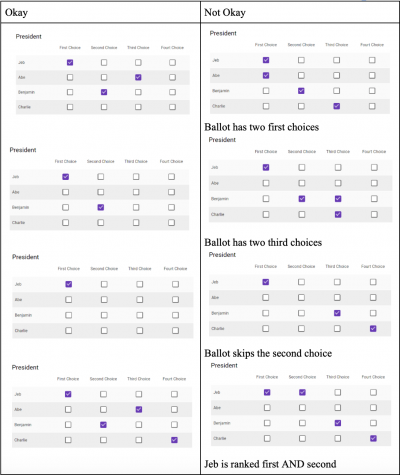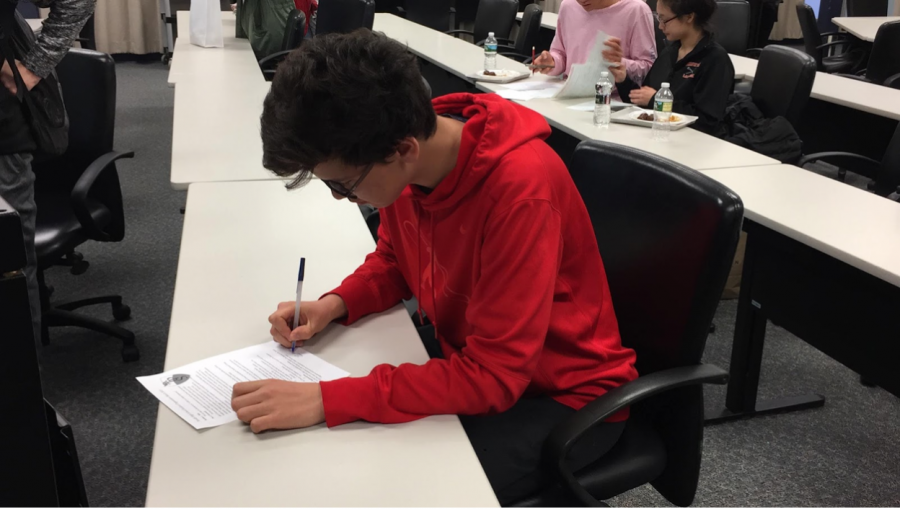Instant Runoff Voting: Creating a Better Democracy
April 27, 2019
It’s that time of year again: Election Season at THS. The election assembly will take place on May 1st, and voting will be open for two days after the assembly. There are two key differences in this year’s elections. Firstly, there will be six elected SO positions as opposed to the normal five: the usual President, Vice President, Treasurer, Secretary, and Junior Board of Ed Rep (two-year term), as well as a Senior Board of Ed Rep to be elected for a one-year term. More importantly, elections for all class and SO positions will be done via instant runoff voting.
The Basics
Instant runoff voting uses ranked choice ballots to simulate a traditional runoff in a single round of voting. Voters rank candidates in order of preference. That vote is counted initially for a voter’s first choice. If there are more than two candidates who receive votes, the last-place candidate with the fewest votes is eliminated. The votes for the eliminated candidate are then redistributed based on voters’ second choice. This process is repeated until someone gets over 50% of the vote.
If this description didn’t do it for you, CGP Grey has a good video which explains this system further.
The Rules
If your ballot does not adhere to the following your vote will not be counted:
- You may not give multiple ranks to one candidate.
- You may not give multiple candidates the same rank.
- You may not ‘skip’ a rank (e.g. you cannot give a rank for 3 unless you have ranked a 2 and a 1).
- You must rank at least one candidate but do not have to rank all of them.
The problem with each of the ballots in the “Not Okay” column is listed below each picture:

Why We Did This
A pivotal role of any high school is to develop and prepare students to be good citizens. Recently in our country, we have seen this idea put to the test as high school students have stepped up and responded in the face of inaction from politicians. It is with this in mind that we sought to overhaul elections at THS in favor of a better and fairer system: instant runoff voting. I have long expressed personal frustration with the status quo of our current election schemes, both locally and nationally (don’t even get me started on the Electoral College). There is a Latin saying, ‘Omnium Rerum Principia Parva Sunt”: the beginnings of all things are small. Change has to start somewhere, and in my newly elected role as SO Treasurer, I had the opportunity to institute that change.
Instant runoff voting has many advantages compared to our current first-past-the-post system. One key downfall in our status quo is the spoiler effect. The spoiler effect is the effect of vote splitting between candidates who appeal to similar groups of voters. Since in ranked voting you can express your desire for more than one candidate and have your vote transferred if your first choice does not win, the spoiler effect is minimized. Additionally, in plurality elections such as ours where many candidates may run, the minimum threshold required to win could be relatively low. For example, the Class of 2021 VP Election last year, which saw seven candidates seek the office, could theoretically be won with only 15% of the vote. This prospect is quite upsetting. Even though 85% of the electorate may not want candidate X to win, the first-past-the-post system does nothing to prevent this outcome from occurring. Furthermore, IRV eliminates the possibility of needing additional runoff elections. These runoffs can unnecessarily extend the already lengthy election process and delay advisors’ ability to begin organizing with future officers.
How It Happened
The process began in May of 2018 at the Officer Leadership retreat, a days-long gathering of the elected officers and class advisors in which they discuss and plan out events for the following year. It was here that I first pitched the idea of transforming our election system to ranked choice voting. The proposal gathered much interest. However, the majority of the cabinet was still far from sold on the system. Over the summer, I continued my research on the topic with the goal of implementing the system for the freshmen elections in the fall. Unfortunately, the timetables collapsed and the deadline to be ready to go for the Class of 2022 elections passed. At the February SO meeting, we presented the proposal to the SO reps. The next month SO R-181901, “A Bill for a Better Democracy,” was voted on and approved unanimously by SO reps.

















































































































































